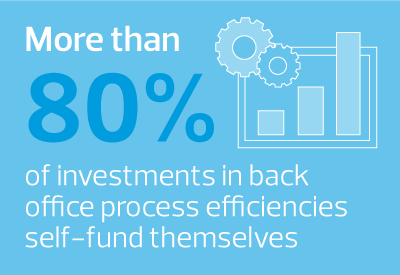Today’s Private Equity CFO: Shifting the Focus from Technology to Data
How a data-driven CFO can drive value from the back office.

This article is part of ACG’s series for executives at private equity-backed companies, sponsored by RSM US LLP, a leading accounting, tax and advisory firm dedicated to the middle market. The article originally appeared on RSM’s website.
Never lose sight of the PE’s value proposition, which is all-around the numbers. As the CFO, you have to get at the information that allows you to analyze and measure, and do it quickly. Having trusted, reliable data is the most important thing.
Shari Franklin
Director, RSM
During the pandemic, the chief financial officer’s office has been integral to business survival—holding the line on costs amid increasingly tightening margins. Faced with cash flow and liquidity challenges, CFOs in private equity portfolio companies became laser-focused on tightening their belts while helping to pivot the business to navigate the rapidly changing economic landscape.
Less Digital Transformation, More Business-led Technology Enablement
For private equity-backed CFOs, managing the budget is now considered table stakes. Today’s CFO is also expected to develop a clear business strategy, often with an emphasis on technology transformation. Never an easy process, pandemic challenges such as supply chain volatility and waning demand elevated the importance of a well-defined strategy to lay the path for unlocking immediate and long-term value. Technology is integral to the process, says Gavin Backos, a principal in the technology and management consulting practice at RSM US, but it should not precede the development of a well-defined data architecture for the finance function.
“Developing a clearly defined plan first is essential for growth,” says Backos, who also leads the firm’s North American CFO advisory practice. “Only then should a CFO choose a technology solution and deploy it to its full potential.”
Growth-minded CFOs need to think beyond the numbers to understand the enterprise value of the internal and external data they are collecting and its importance to strategic decision-making. Data-driven CFOs are prepared to share these financial insights with key stakeholders, including management, the board and private equity investors—even vendors and customers.
“There’s an opportunity to think holistically about delivering financial results,” says Shari Franklin, management consulting director at RSM US. Publishing the financials and key performance measures is the end product, but understanding the performance measurements needs to happen first.”
As a former CFO of a PE-backed medical association, Franklin has learned that insights on operational and financial performance are often buried in the back office. Unearthing them sometimes calls for an operational assessment to define areas for process improvement.
Demonstrating Speed to Value Through Quick Wins

Speed and agility are essential for meeting the demands of PE investors. The predictive insights gleaned from the back office can help identify business improvements that can be implemented quickly to drive immediate and long-term growth across the organization, improve efficiencies and enhance earnings. “These aren’t big expensive projects, but more often midrange investments that are high-impact and low-cost,” Backos says. Relying on trial and error to get at answers doesn’t necessarily get the job done. Particularly for companies new to PE, the finance function may require some significant recalibrating.
“Never lose sight of the PE’s value proposition, which is all-around the numbers,” says Franklin. “As the CFO, you have to get at the information that allows you to analyze and measure, and do it quickly. Having trusted, reliable data is the most important thing.”
Knowing what solutions will quickly yield measurable results is a specialized skill that takes development and practice, which the PE operating partners may not have in their ranks. Moreover, risks permeate throughout all financial processes and without an understanding of where these risks exist, portfolio companies are left vulnerable to outcomes that could affect the bottom line and potentially have external consequences. If resources aren’t available to focus on these areas, portfolio company CFOs should consider bringing in an external advisor to help identify and prioritize initiatives.
Focusing on Risk Management is Critical
As businesses continue to rely heavily on information technology systems daily and with the proliferation of digital transformation and automation, portfolio companies need to be increasingly diligent about protecting the enterprise against threats to the integrity, confidentiality, and availability of systems and data. By understanding the PE firm’s risk profile and appetite, the CFO can design a risk program that strategically and affordably mitigates undesirable risks to prevent loss of time, increased costs and damaged reputation.
Cybersecurity remains a top concern for middle market companies that can be easy prey for attackers if they do not have appropriate preventative controls in place. Cyberthreat prevention used to fall solely on the shoulders of IT, but today the responsibility extends across the enterprise. Security measures should be developed specifically for the finance function. A cyberattack can be devastating if a company cannot financially recover from an incident. A solid approach is to conduct a risk assessment to identify areas of vulnerability and attack issues before they evolve into a problem.
The Role of the CFO Will Continue to Expand
While CFOs must focus on the financial close and reporting processes, their ability to mine data and present it with trust in the numbers is priceless. They have an increased responsibility to help protect company data and enhance privacy and security. These are core fundamentals, which present ongoing challenges due to changes in innovation, industry, automation and other factors. Only by focusing on and continuously refreshing strategy can CFOs remain ahead of the curve.
RSM’s technical experience, industry focus and leadership in the middle market make us uniquely positioned to help portfolio companies navigate these challenges and drive results. We can help PE-backed CFOs unpack their business and operational issues and point them in the right direction to become more efficient, effective and profitable.


